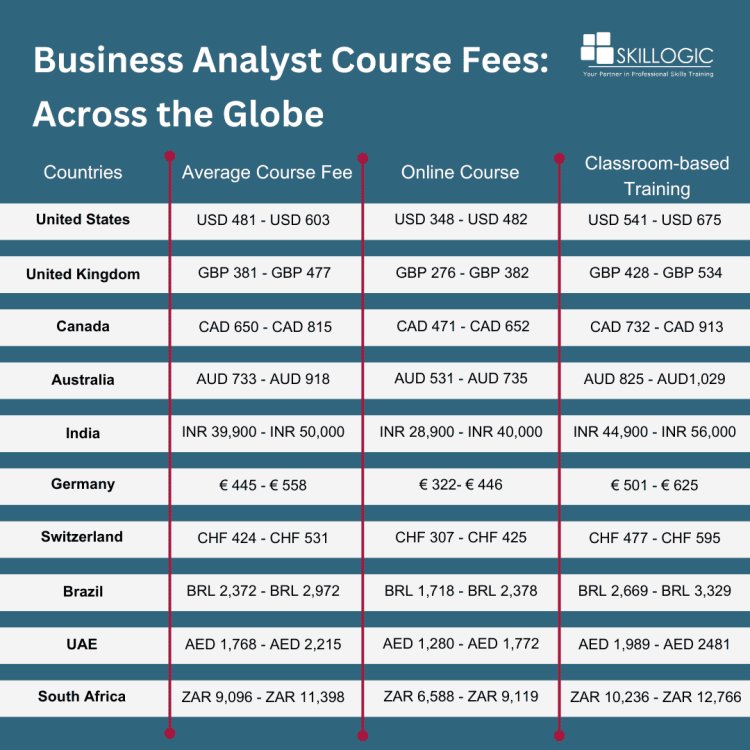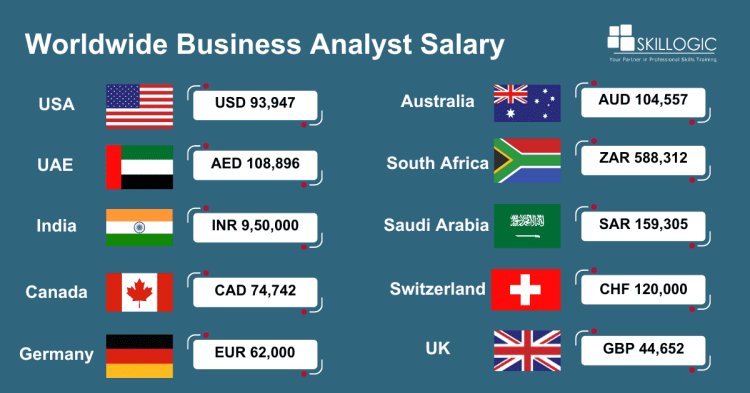Business Analyst Course Fees
Explore the essential details of a Business Analyst course, including key skills, certification, and career opportunities. Learn how to make an informed decision about your educational investment.

In today's fast-paced and dynamic business environment, the role of a Business Analyst (BA) is increasingly crucial. BAs serve as the bridge between business objectives and technology solutions, driving innovation, efficiency, and profitability. Aspiring professionals seeking to enter this field often opt for specialized courses to equip themselves with the necessary skills and knowledge. However, one of the significant considerations for individuals planning to pursue such courses is the associated fees, which can vary significantly depending on the country of study.
According to a report by Allied Market Research, in 2023, the worldwide business analytics market hit $225.3 billion in value, with projections suggesting it will reach $665.7 billion by 2033. This forecast indicates a compound annual growth rate (CAGR) of 11.6% from 2024 to 2033.
In this article, we'll delve into the Business Analyst course fee programs in major countries across the globe, providing insights for prospective students to make informed decisions.
Business Analytics: Understanding the Core of Data-Driven Decision-Making
Business analytics encompasses the methodologies, technologies, and practices for continuous iterative exploration and investigation of past business performance to gain insight and drive business planning. It involves the analysis of data to identify trends, patterns, and correlations that can guide strategic decision-making within an organization.
As per a report from Mordor Intelligence, the Business Analytics market was valued at USD 81.46 billion in the preceding year and is projected to reach USD 130.95 billion in the upcoming five years, with a forecasted compound annual growth rate (CAGR) of 8.07% during the specified period. Business analysts play a crucial role in this process, acting as interpreters of data to inform business strategies and drive growth.
Refer:
- Business Analyst Vs Business Analytics Expert
- Business Intelligence Vs Business Analytics – Comparison
- How To Become A Business Analytics Expert?
Essential Skills Required to Become a Successful Business Analyst
To thrive in the field of business analytics, professionals require a diverse skill set that combines technical expertise with strong analytical and communication abilities. Here are some essential skills required to become a successful business analyst, presented in points:
Analytical Skills: Ability to gather, analyze, and interpret complex data from various sources to make informed business decisions.
Problem-solving Skills: Capacity to identify problems, propose solutions, and implement effective strategies to address business challenges.
Communication Skills: Strong verbal and written communication skills to articulate findings, present recommendations, and facilitate discussions between stakeholders.
Interpersonal Skills: Capability to collaborate and build relationships with diverse teams, including executives, clients, developers, and other stakeholders.
Critical Thinking: Aptitude to evaluate information objectively, assess implications, and foresee potential outcomes to support strategic planning.
Domain Knowledge: Understanding of industry-specific concepts, trends, and best practices relevant to the business environment in which the analyst operates.
Requirements Elicitation and Management: Proficiency in eliciting, documenting, and managing business requirements to ensure alignment between business needs and IT solutions.
Data Analysis Tools: Familiarity with various data analysis tools and techniques such as Excel, SQL, data visualization software, and statistical methods to extract insights from data.
Business Process Modeling: Competency in modeling and documenting business processes using techniques like BPMN (Business Process Model and Notation) to improve efficiency and effectiveness.
Adaptability and Flexibility: Adapting to changing priorities, requirements, and technologies in dynamic business environments.

Business Analyst Course Fees: Across the Globe
United States:
- Business Analyst Course Average Fee in USA: USD 481 - USD 603
- Business Analyst Online Course Average Fees: USD 348 - USD 482
- Business Analyst Classroom based Training Course Average Fee: USD 541 - USD 675
United Kingdom:
- Average Course Fee: GBP 381- GBP 477
- Online Course: GBP 276 - GBP 382
- Classroom-based Training: GBP 428 - GBP 534
Canada:
- Average Course Fee: CAD 650 - CAD 815
- Online Course: CAD 471- CAD 652
- Classroom-based Training: CAD 732 - CAD 913
Australia:
- Average Course Fee: AUD 733 - AUD 918
- Online Course: AUD 531 - AUD 735
- Classroom-based Training: AUD 825 - AUD1,029
India:
- Average Course Fee: INR 39,900 - INR 50,000
- Online Platforms: INR 28,900 - INR 40,000
- Classroom-based Training: INR 44,900 - INR 56,000
Germany:
- Average Course Fee: € 445 - €558
- Online Platforms: €322- €446
- Classroom-based Training: €501 - €625
Switzerland
- Average Course Fee: CHF 424 -CHF 531
- Online Platforms: CHF 307- CHF 425
- Classroom-based Training: CHF 477- CHF 595
Brazil:
- Average Course Fee: BRL 2,372 - BRL 2,972
- Online Platforms: BRL 1,718- BRL 2,378
- Classroom-based Training: BRL 2,669 - BRL 3,329
UAE:
- Average Course Fee: AED 1,768 -AED 2,215
- Online Platforms: AED 1,280 -AED 1,772
- Classroom-based Training: AED 1,989- AED 2481
South Africa:
- Average Course Fee: ZAR 9,096 - ZAR 11,398
- Online Platforms: ZAR 6,588 - ZAR 9,119
- Classroom-based Training: ZAR 10,236 - ZAR 12,766
Factors Influencing Business Analyst Course Fees
Type of Course: Business analyst training programs come in various formats, including online courses, in-person workshops, boot camps, and full-fledged degree programs. The type of course you choose will significantly impact the cost. Generally, more comprehensive programs, such as degree programs or extensive boot camps, tend to be more expensive.
Duration and Intensity: The length and intensity of the course also play a role in determining its cost. Short, focused courses or workshops may have lower fees compared to longer-term programs that delve deeper into various aspects of business analysis.
Instructor Expertise and Reputation: Courses led by industry experts or instructors with extensive experience in business analysis may command higher fees due to the perceived value of learning from seasoned professionals.
Curriculum and Resources: Courses that offer additional resources such as textbooks, online libraries, software licenses, and certification exam preparation materials may have higher fees to cover these resources' costs.
Institution or Provider Reputation: The reputation of the institution or provider offering the course can also influence its cost. Established universities, reputable training institutes, and well-known online learning platforms may charge higher fees due to their brand recognition and perceived quality.
Refer:
- Business Analytics Expert in India?
- Business Analytics Course Fee in India?
- Business Analytics Scope in India
Worldwide Business Analyst Salary
- The salary of a business analyst in USA ranges from USD 93,947 per year according to a Glassdoor report.
- The salary of a business analyst in UAE ranges from AED 108,896 per year according to an Indeed report.
- The salary of a business analyst in India ranges from INR 9,50,000 per year according to a Glassdoor report.
- The salary of a business analyst in Canada ranges from CAD 74,742 per year according to a Glassdoor report.
- The salary of a business analyst in Germany ranges from EUR 62,000 per year according to a Glassdoor report.
- The salary of a business analyst in Australia ranges from AUD 104,557 per year according to a Indeed report.
- The salary of a business analyst in South Africa ranges from ZAR 588,312 per year according to a Indeed report.
- The salary of a business analyst in Saudia Arabia ranges from SAR 159,305 per year according to a PayScale report.
- The salary of a business analyst in Switzerland ranges from CHF 120,000 per year according to a Talent.com report.
- The salary of a business analyst in UK ranges from GBP 44,652 per year according to an Indeed report.

Factors Influencing the Business Analyst's Salary
Here are the factors that can influence the salary of a business analyst, presented in points:
Experience: The number of years of experience in the field significantly impacts a business analyst's salary. Generally, more experienced professionals command higher salaries due to their depth of knowledge and expertise.
Industry: Salaries can vary across industries. Business analysts working in sectors such as finance, healthcare, or technology often receive higher compensation due to the complexity and criticality of their work within these sectors.
Location: The geographic location of the job can significantly influence salary levels. Business analysts working in metropolitan areas or regions with a high cost of living typically command higher salaries compared to those in rural areas.
Company Size and Type: Larger companies or organisations with greater resources tend to offer higher salaries to business analysts. Additionally, working for prestigious or Fortune 500 companies may lead to higher compensation packages.
Skills and Specializations: Business analysts with specialized skills or expertise in areas such as data analytics, project management, or specific software tools may command higher salaries due to their in-demand skills.
Responsibilities and Scope: The level of responsibility and scope of the role can impact salary levels. Business analysts leading larger projects or teams, or those responsible for strategic decision-making, may receive higher compensation.
Performance and Achievements: Exceptional performance, demonstrated through successful project outcomes, cost savings, process improvements, or other measurable achievements, can lead to salary increases, bonuses, or promotions.
Market Demand: Demand-supply dynamics within the job market can influence salary levels for business analysts. In sectors or regions experiencing high demand for skilled professionals, salaries may be more competitive.
Refer:
- Business Analytics Course Fee in Bangalore
- Business Analytics Course Fee in Hyderabad
- Business Analytics Course Fee in Pune
When considering enrolling in a business analyst course, it's essential to research thoroughly, considering factors such as curriculum, faculty expertise, industry partnerships, and alumni success stories. While course fees are important, the value derived from acquiring in-demand skills and advancing one's career prospects often outweighs the initial investment. With the right combination of skills and knowledge, aspiring business analysts can embark on a rewarding journey towards driving business success through data-driven insights.
Prospective business analysts have abundant opportunities to enhance their expertise and knowledge through various educational channels, including esteemed institutions like SKILLOGIC®. Recognized as a premier international training provider, SKILLOGIC® institute offers specialized certification programs across diverse fields such as Project Management, Quality Management, Cybersecurity, Software Development, and Business Analytics. With a distinguished track record spanning more than a decade, SKILLOGIC® has established itself as a frontrunner in the industry, serving a diverse global community of over 100+ learners. Their comprehensive portfolio comprises more than 25 accreditations and partnerships, backed by a dedicated team of over 100 experienced instructors.
SKILLOGIC provides expert-led certification courses in Six Sigma, PMP, Cybersecurity, and Business Analytics. Known for its high-quality training, the institute offers valuable real-world industry insights. With over a decade of experience, SKILLOGIC’s Business Analyst course is available in offline mode in Bangalore, Chennai, Pune, and Hyderabad, making learning accessible across India.

0
747